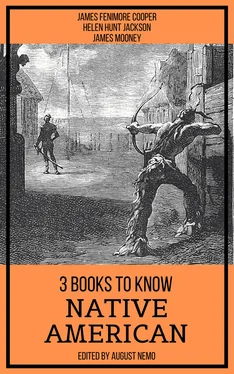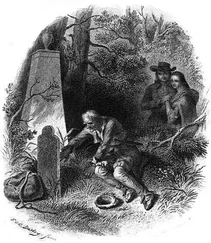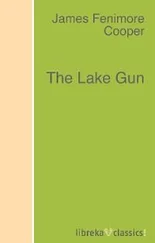To these ardent and nearly incoherent words Cora made no other answer than by straining the youthful speaker to her heart, as she bent over her, in melting tenderness. The manhood of Heyward felt no shame in dropping tears over this spectacle of affectionate rapture; and Uncas stood, fresh and blood-stained from the combat, a calm, and, apparently, an unmoved looker-on, it is true, but with eyes that had already lost their fierceness, and were beaming with a sympathy that elevated him far above the intelligence, and advanced him probably centuries before the practices of his nation.
During this display of emotions so natural in their situation, Hawkeye, whose vigilant distrust had satisfied itself that the Hurons, who disfigured the heavenly scene, no longer possessed the power to interrupt its harmony, approached David, and liberated him from the bonds he had, until that moment, endured with the most exemplary patience.
“There,” exclaimed the scout, casting the last withe behind him, “you are once more master of your own limbs, though you seem not to use them with greater judgment than that in which they were first fashioned. If advice from one who is not older than yourself, but who having lived most of his time in the wilderness, may be said to have experience beyond his years, will give no offence, you are welcome to my thoughts; and these are, to part with the little tooting instrument in your jacket to the first fool you meet with, and buy some useful we’pon with the money, if it be only the barrel of a horseman’s pistol. By industry and care, you might thus come to some prefarment; for by this time, I should think, your eyes would plainly tell you that a carrion crow is a better bird than a mocking thresher. The one will, at least, remove foul sights from before the face of man, while the other is only good to brew disturbances in the woods, by cheating the ears of all that hear them.”
“Arms and the clarion for the battle, but the song of thanksgiving to the victory!” answered the liberated David. “Friend,” he added, thrusting forth his lean, delicate hand towards Hawkeye, in kindness, while his eyes twinkled and grew moist, “I thank thee that the hairs of my head still grow where they were first rooted by Providence; for, though those of other men may be more glossy and curling, I have ever found mine own well suited to the brain they shelter. That I did not join myself to the battle, was less owing to disinclination, than to the bonds of the heathen. Valiant and skilful hast thou proved thyself in the conflict, and I hereby thank thee, before proceeding to discharge other and more important duties, because thou hast proved thyself well worthy of a Christian’s praise.”
“The thing is but a trifle, and what you may often see, if you tarry long among us,” returned the scout, a good deal softened towards the man of song, by this unequivocal expression of gratitude. “I have got back my old companion, ‘Killdeer,’” he added, striking his hand on the breech of his rifle; “and that in itself is a victory. These Iroquois are cunning, but they outwitted themselves when they placed their fire-arms out of reach; and had Uncas or his father been gifted with only their common Indian patience, we should have come in upon the knaves with three bullets instead of one, and that would have made a finish of the whole pack; yon loping varlet, as well as his commerades. But ’twas all foreordered, and for the best.”
“Thou sayest well,” returned David, “and hast caught the true spirit of Christianity. He that is to be saved will be saved, and he that is predestined to be damned will be damned. This is the doctrine of truth, and most consoling and refreshing it is to the true believer.”
The scout, who by this time was seated, examining into the state of his rifle with a species of parental assiduity, now looked up at the other in a displeasure that he did not affect to conceal, roughly interrupting further speech.
“Doctrine, or no doctrine,” said the sturdy woodsman, “’tis the belief of knaves, and the curse of an honest man. I can credit that yonder Huron was to fall by my hand, for with my own eyes I have seen it; but nothing short of being a witness will cause me to think he had met with any reward, or that Chingachgook, there, will be condemned at the final day.”
“You have no warranty for such an audacious doctrine, nor any covenant to support it,” cried David, who was deeply tinctured with the subtle distinctions which, in his time, and more especially in his province, had been drawn around the beautiful simplicity of revelation, by endeavoring to penetrate the awful mystery of the divine nature, supplying faith by self-sufficiency, and by consequence, involving those who reasoned from such human dogmas in absurdities and doubt; “your temple is reared on the sands, and the first tempest will wash away its foundation. I demand your authorities for such an uncharitable assertion (like other advocates of a system, David was not always accurate in his use of terms). Name chapter and verse; in which of the holy books do you find language to support you?”
“Book!” repeated Hawkeye, with singular and ill-concealed disdain; “do you take me for a whimpering boy at the apron-string of one of your old gals; and this good rifle on my knee for the feather of a goose’s wing, my ox’s horn for a bottle of ink, and my leathern pouch for a cross-barred handkercher to carry my dinner? Book! what have such as I, who am a warrior of the wilderness, though a man without a cross, to do with books? I never read but in one, and the words that are written there are too simple and too plain to need much schooling; though I may boast that of forty long and hard-working years.”
“What call you the volume?” said David, misconceiving the other’s meaning.
“Tis open before your eyes,” returned the scout; “and he who owns it is not a niggard of its use. I have heard it said that there are men who read in books to convince themselves there is a God. I know not but man may so deform his works in the settlement, as to leave that which is so clear in the wilderness a matter of doubt among traders and priests. If any such there be, and he will follow me from sun to sun, through the windings of the forest, he shall see enough to teach him that he is a fool, and that the greatest of his folly lies in striving to rise to the level of One he can never equal, be it in goodness, or be it in power.”
The instant David discovered that he battled with a disputant who imbibed his faith from the lights of nature, eschewing all subtleties of doctrine, he willingly abandoned a controversy from which he believed neither profit nor credit was to be derived. While the scout was speaking, he had also seated himself, and producing the ready little volume and the iron-rimmed spectacles, he prepared to discharge a duty, which nothing but the unexpected assault he had received in his orthodoxy could have so long suspended. He was, in truth, a minstrel of the western continent — of a much later day, certainly, than those gifted bards, who formerly sang the profane renown of baron and prince, but after the spirit of his own age and country; and he was now prepared to exercise the cunning of his craft, in celebration of, or rather in thanksgiving for, the recent victory. He waited patiently for Hawkeye to cease, then lifting his eyes, together with his voice, he said, aloud —
“I invite you, friends, to join in praise for this signal deliverance from the hands of barbarians and infidels, to the comfortable and solemn tones of the tune, called ‘Northampton.’”
He next named the page and verse where the rhymes selected were to be found, and applied the pitch-pipe to his lips, with the decent gravity that he had been wont to use in the temple. This time he was, however, without any accompaniment, for the sisters were just then pouring out those tender effusions of affection which have been already alluded to. Nothing deterred by the smallness of his audience, which, in truth, consisted only of the discontented scout, he raised his voice, commencing and ending the sacred song without accident or interruption of any kind.
Читать дальше












